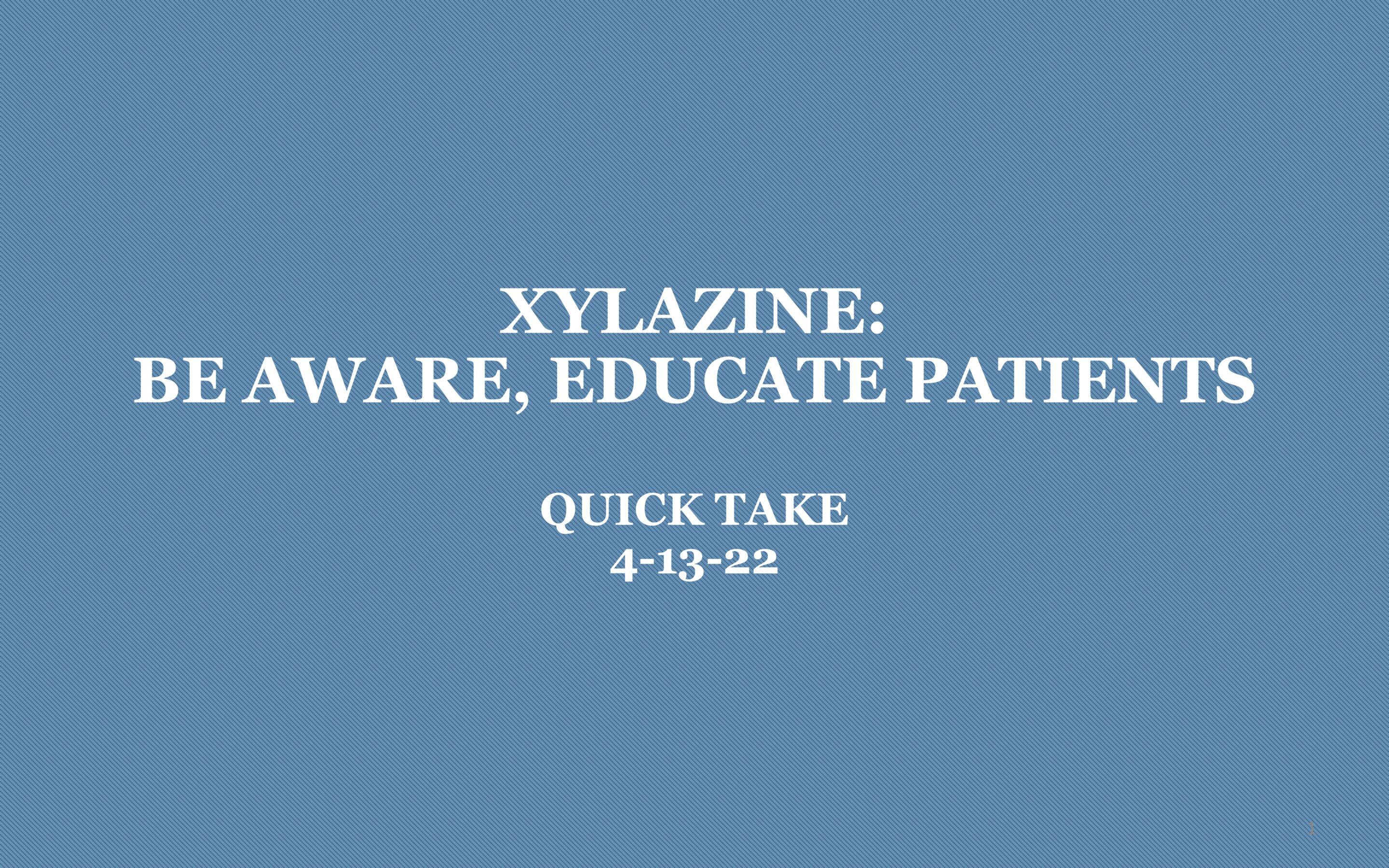
Measurement Based Care for VBP – Behavioral Health VBP Part 2
https://www.integratedcaredc.com/wp-content/uploads/2023/08/Measurement-Based-Care-for-VBP-–-Behavioral-Health-VBP-Part-2.mp4 Description: The use of measurement-based care (MBC) centers on the use of regular patient-reported outcome measures throughout their...
Accountable Care Organization (ACO) Fundamentals
A basic overview of the structure and function of Accountable Care Organizations (ACO) as well as an exploration of their challenges and opportunities in advancing value based care contracts with the government and private payers.
Value-Based Payment: Is it disrupting health care for the better? Role of a Capitated Alternative Payment Model – FQHC Part 2
This webinar will focus on the “why” of transitioning from fee-for-service to capitation to pay for community health center direct services. Dr. Jones will discuss how fee-for-service reimbursement limits patient access to care and hampers efforts to improve patient self-management and accountability for their own health. He will share examples of how innovators are using lessons learned from other service industries to disrupt the health care market. Participants will learn how moving away from the fee-for-service system can preserve revenue streams but also support new models of care, and how payment reform can help to address primary care workforce shortages.
Understanding Key Terms in Managed Care Contracts – VBP Legal Training Part 2
Managed care contracts, like many legal contracts, are challenging to understand. This session will provide a roadmap to key terms commonly found in managed care contracts. The session will explain what these terms mean in plain language and offer examples of favorable and unfavorable terms. In addition, the session will offer pointers for evaluating the favorability of contract terms and describe potential changes to standard terms that participants may wish to address during negotiations.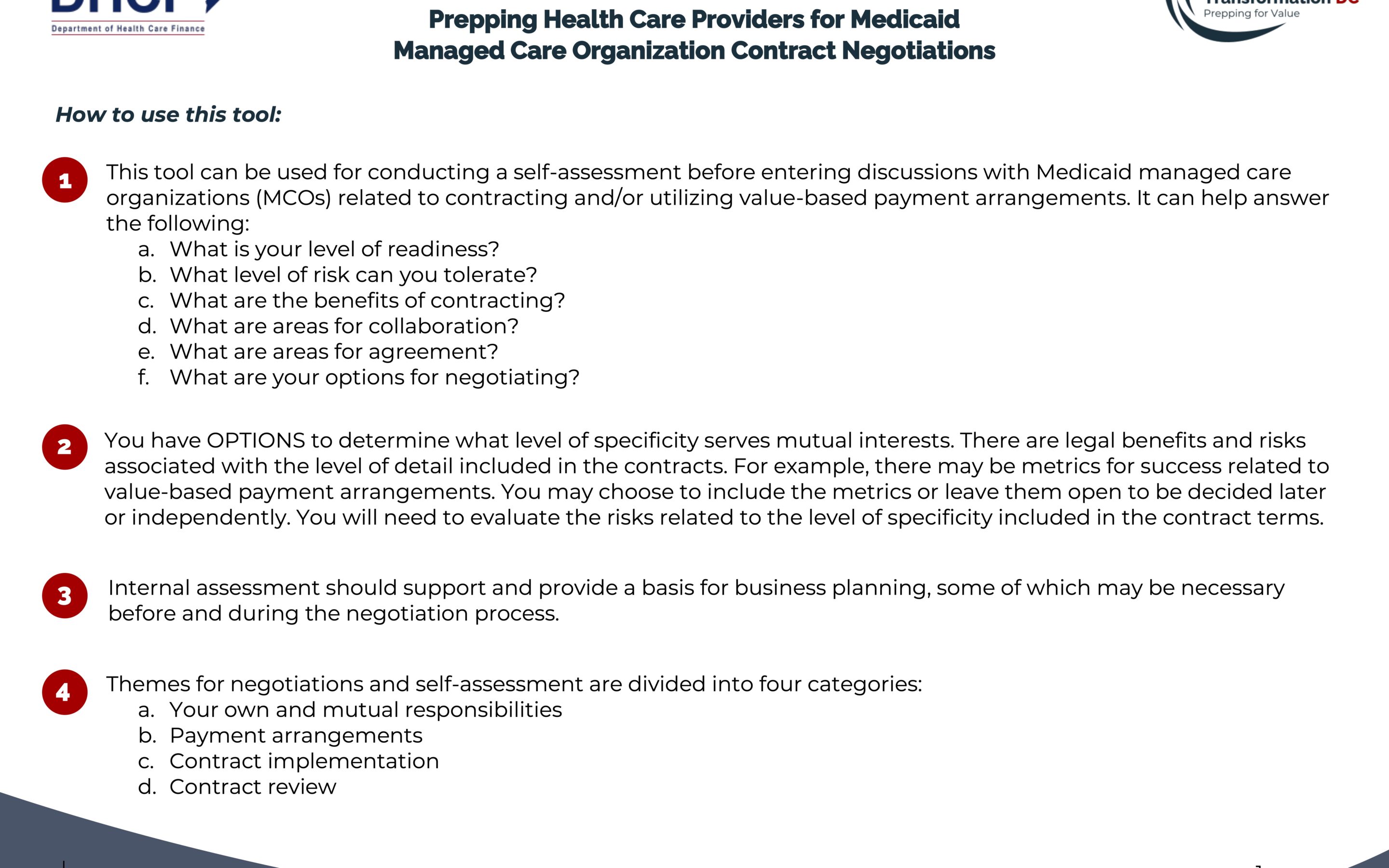
Health Care Provider Checklist for Entering into Managed Care Contracts
This is a self-assessment tool intended to help health care providers plan for negotiations around proposed managed care contracts. The tool can be used for internal conversations to analyze key terms, develop strategic direction, and set priorities for approaching negotiations. This tool can help providers determine if they are ready to contract, what level of risk they can tolerate, and what areas to focus on in negotiations.
Promise and Perils of Value Based Purchasing VBP – Behavioral Health VBP Part 1
Value is a function of impact and cost. BH providers provide a very high-impact, relatively low-cost service. As such, payment methodologies that reward value should be an opportunity for them to increase their revenue. But that's a theory that only plays out in practice sometimes. Come learn what BH providers need to do to be successful in a value-based environment.
Value-Based Purchasing 101: The “Basics” – VBP Foundations Part 1
An introduction to the basic concepts, structures, models, and mechanics of value-based payments.
Clinically Integrated Networks: Build, Buy or Stay on the Sidelines – FQHC Part 1
CMS has signaled its intent to move from strict fee-for-service reimbursement to value-based payment for Medicaid as it has been actively doing for Medicare over the past decade. A few FQHCs are pursuing advanced alternative payment models on their own but most are choosing to clinically integrate with others, especially other FQHCs. This session will share national experiences from these initiatives and provide a framework for evaluating strategic options for DC FQHCs to progress in their pursuit of advanced alternative payment models.
Strategies for Negotiating Managed Care Contracts – VBP Legal Training Part 1
This is a self-assessment tool intended to help healthcare providers plan for negotiations around proposed managed care contracts. The tool can be used for internal conversations to analyze key terms, develop strategic direction, and set priorities for approaching negotiations. This tool can help providers determine if they are ready to contract, what level of risk they can tolerate, and what areas to focus on in negotiations.
Engaging Families In Primary Care Behavioral Health (PCBH Series Part 12)
PCBH services not only facilitate change at the individual level but impact the family system. Conversely, family engagement in PCBH services can expedite the achievement and sustainability of an individual’s health goals. Strategies will be discussed that can help enhance family engagement within the PCBH model of care.
LGBTQ+ Cultural Competency Training – Part 2
https://www.integratedcaredc.com/wp-content/uploads/2023/06/LGBTQ-Cultural-Competency-Training-Part-2.mp4 Description: Lesbian, gay, bisexual, transgender, and questioning/queer (LGBTQ+) individuals are frequently underserved and experience significant...
Integrated Care DC Managed Care Readiness Workshop
View materials from this event hosted by Department of Health Care Finance, DBH Training Institute, & Integrated Care DC on May 9, 2023. The in-person workshop was designed for behavioral health providers and other organizations seeking to prepare for the integration of behavioral health into the District’s Medicaid Managed Care Program. Presenters shared information and facilitated exercises to help leadership, clinical and operational staff, and other stakeholders develop the organizational competencies needed to succeed in managed care, including an understanding of managed care principles, how to communicate effectively with managed care partners, and how to effectively demonstrate the value of care through quality measurement and population health.New Diagnosis of a Chronic Medical Condition (PCBH Series Part 11)
The diagnosis of a long-term health condition can be frightening and overwhelming for many people. Behavioral health professionals working in integrated care settings have the unique opportunity to intervene early to assist individuals with adjusting and adapting to the new demands for behavior change that accompany a new diagnosis.
LGBTQ+ Cultural Competency Training Part 1
Lesbian, gay, bisexual, transgender, and questioning/queer (LGBTQ+) individuals are frequently underserved and experience significant disparities in health outcomes and accessing preventive and ongoing healthcare. Sexual and gender minorities (SGM) often experience discrimination and bias in health care settings and may delay or avoid medical and preventive care. Developing safe, culturally competent healthcare environments and practices for LGBTQ+ patients is critical and closely related to individuals’ willingness to openly share their sexual orientation and/or gender identity and expression (SOGIE). Capturing SOGIE data is critical as it allows providers to have a more comprehensive picture of key factors that influence care. This session will start with a brief discussion of SOGIE terminology and a compilation of what is known about medical and behavioral health needs and disparities among the LGBTQ+ community. We will highlight the critical need for creating environments that improve patients’ psychological safety and increase their willingness to share SOGIE characteristics. We will share examples of how this data could be utilized to improve care and patient satisfaction, including capturing a patient’s preferred name and pronouns, and ways to engage in respectful conversations that could reveal key aspects of their medical history that could otherwise go unnoticed.
Dosing and Titrating Care (PCBH Series Part 10)
A core skill in caring for patients in primary care is the ability to dose and titrate care for individual patients in a way that produces quality outcomes for the patient and allows a provider to care for populations of patients effectively. This session will increase the mindfulness and skills clinicians employ for dosing and titrating care from within the PCBH model.Addressing Grief in PCBH (PCBH Series Part 9)
Loss and grief are common and often come up during primary care encounters. Grief can be caused by separations, incapacity, bereavement, migration, job loss, birth, retirement, or professional loss. We will focus on addressing grief related to the loss of a loved one in this webinar. One-third of people affected by loss can experience physical or mental health problems, such as increased risk of heart disease, suicide, psychosomatic disorders, and psychiatric issues. However, loss can also lead to personal growth. Behavioral Health Consultants can help PCPs and patients prepare for grief and build coping skills for better health outcomes.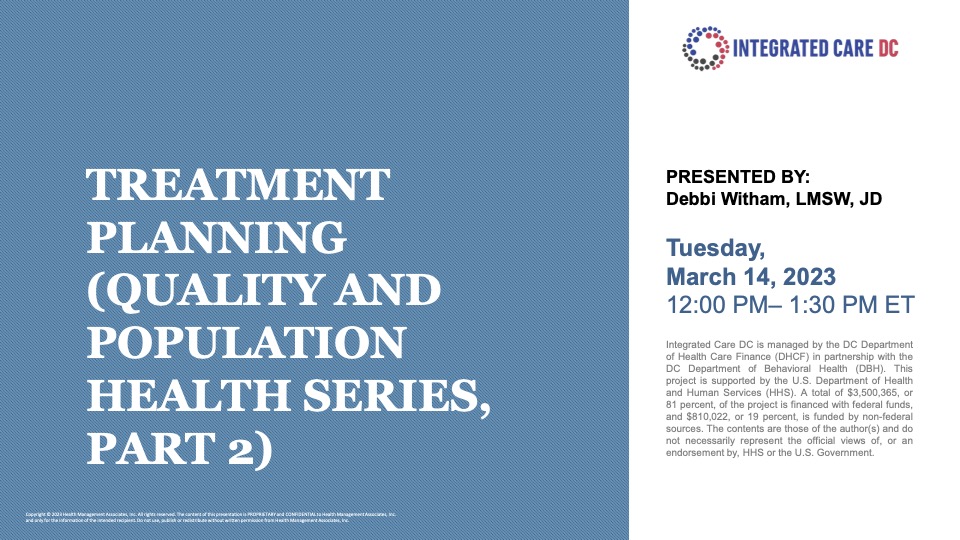
Treatment Planning (Quality & Population Health Series, Part 2)
We often think of the treatment plan as a document to complete. However, it can be a tool to engage and empower the person served in their own recovery process. In this interactive webinar we will learn the core components of the treatment planning process from a person-centered and engagement-focused lens.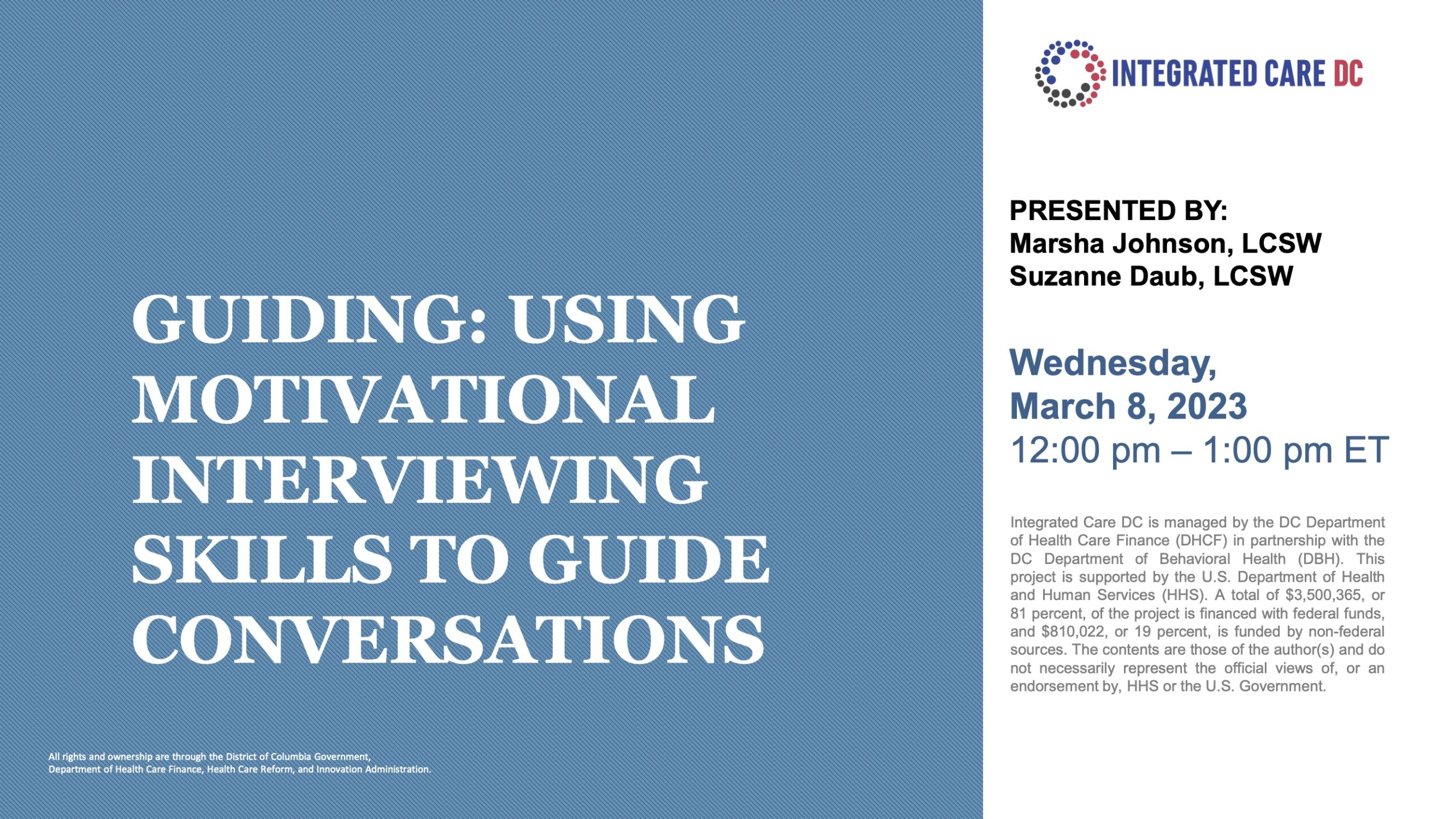
Guiding: Using Motivational Interviewing Skills to Guide Conversations (Motivational Interviewing Series, Part 2)
There are three main approaches to helping people make a change, directing, following, and a middle-of-the-road approach of guiding. Motivational Interviewing (MI) promotes guiding as an approach to discovering and uncovering an individual’s motivations, concerns, values, and options. This refresher workshop will provide the opportunity to directly practice using MI skills to build discrepancy and move conversations towards enhancing commitment to change.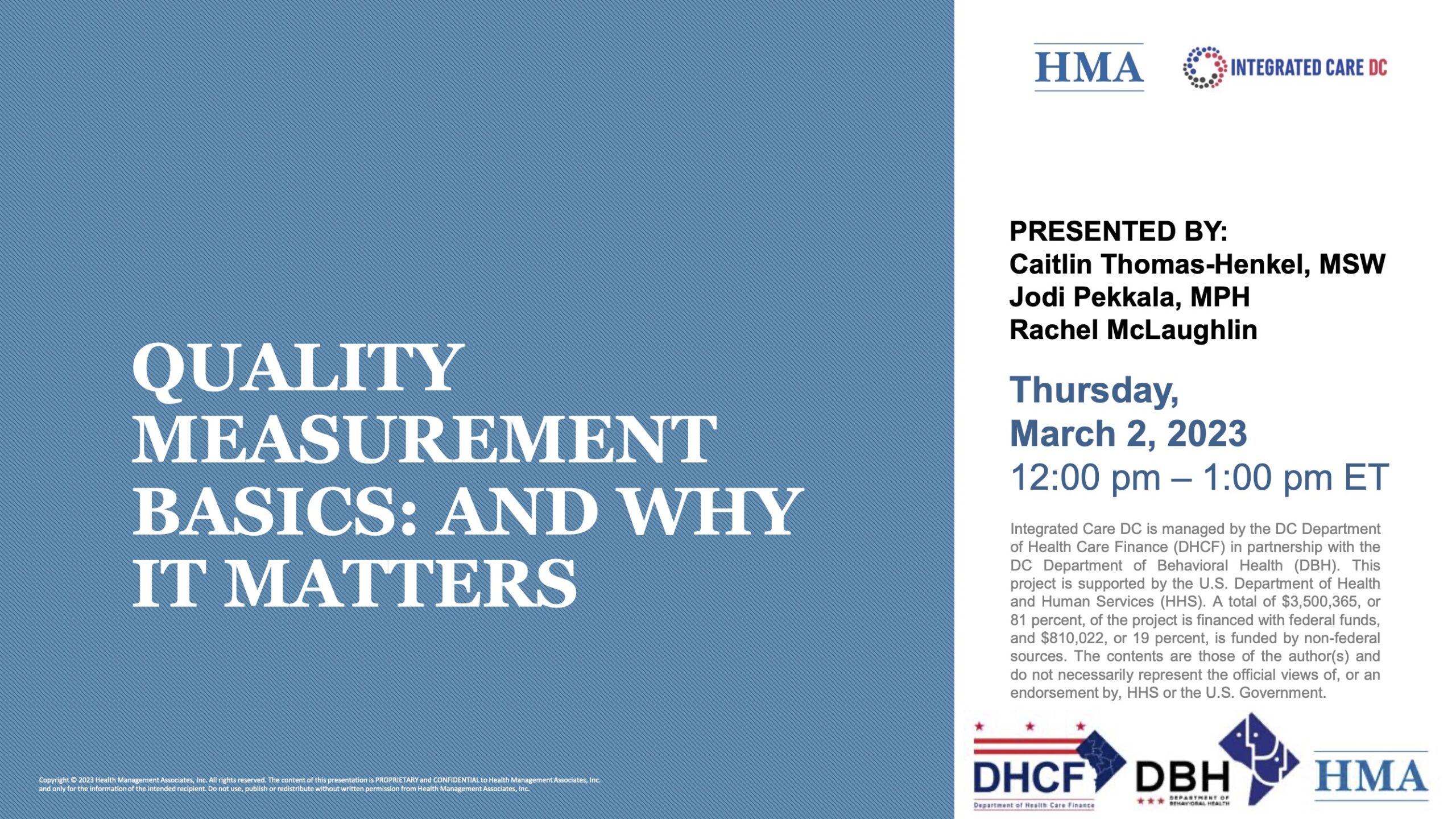
Quality Measurement Basics: And Why it Matters (Quality & Population Health Series, Part 1)
Understanding, measuring, working to improve quality performance are critical to ensuring that patients have positive outcomes and providers are satisfied—they’re also critical to ensure your practice is meeting its regulatory requirements and maximizing payment opportunities. As the District of Columbia carves in behavioral health care to managed care arrangements and requires more providers to be in value-based care arrangements, it is even more imperative that quality measurement and improvement is understood and infused across your organization—from providers, to leaders, to auxiliary staff. This two-part series will describe the quality measurement basics and why it matters, and then treatment planning for population health. In Part 1, we will explore why we need to infuse a culture of quality within healthcare organizations, including an understanding of what we value, who we serve, and who we are accountable to. Presenters will emphasize the importance of all staff understanding quality and its impact on our patients, staff and organization. We will review the basics of measurement and key measures in quality focused on integrated care.Is a 20-minute consultation realistic? (PCBH Series Part 8)
In making the transition from practicing outpatient behavioral health to primary care behavioral health, clinicians often wonder, how can I do my work in 20 minutes, and is it really possible to make a meaningful difference in this amount of time? This training answers this question directly by simulating a 20 minute behavioral health consultation and discussing as a group each stage of the encounter, best practices, and the strengths and challenges that arise.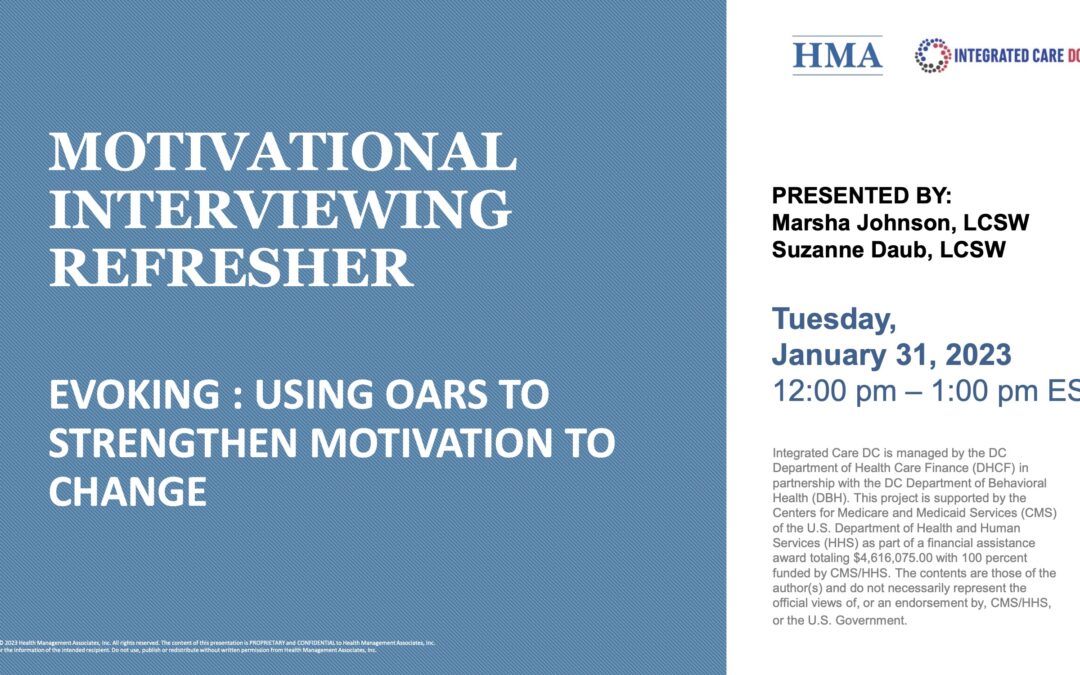
Motivational Interviewing Refresher: Using Open Ended Questions, Affirmations, Reflection & Summarizing (OARS) Skills to Strengthen Motivation to Change (Motivational Interviewing Series, Part 1)
In this first workshop, will spend the majority of the time directly practicing foundational OARS skills to evoke interest and commitment to making health behavior changes.Sustainable Trauma Treatment: How Accelerated Resolution Therapy can be Utilized in a PCBH Setting to Effectively Treat Trauma (PCBH Part 7)
Evidence-based modalities developed to treat trauma are commonplace in outpatient behavioral health practices, but we often struggle to adapt these therapies to the integrated care setting where brief intervention is common. In this session, we will present Accelerated Resolution Therapy (ART) as a useful tool for treating trauma in an integrated setting. Accelerated Resolution Therapy has been shown to achieve benefits rapidly, usually within 1-5 sessions, and is effective in treating PTSD and complex trauma as well as other mental health problems such as anxiety, depression, phobias, grief, chronic pain, and relationship issues. We will explore the basics of Accelerated Resolution Therapy, highlight examples of how it has been used effectively in the primary care setting, and discuss both benefits and barriers to implementing this modality. We will focus on the compatibility of this therapy as a brief intervention within the PCBH model and the particular benefit of sustainability as Accelerated Resolution Therapy reduces exposure to vicarious trauma – critical to clinician self-care and preservation in these trying times.Allowing Data to Tell a Story: Relevant Metrics to Help Reflect the Infinite Values of Integrated Healthcare (PCBH Part 6)
As healthcare centers around the country further embrace data and metrics, integrated primary care behavioral health programs must incorporate data to reflect the value of work being done. In this webinar, attendees will learn about primary data and metric points and the importance of ensuring that data tells a story and reflects the infinite values of health systems, rather than becoming finite goals.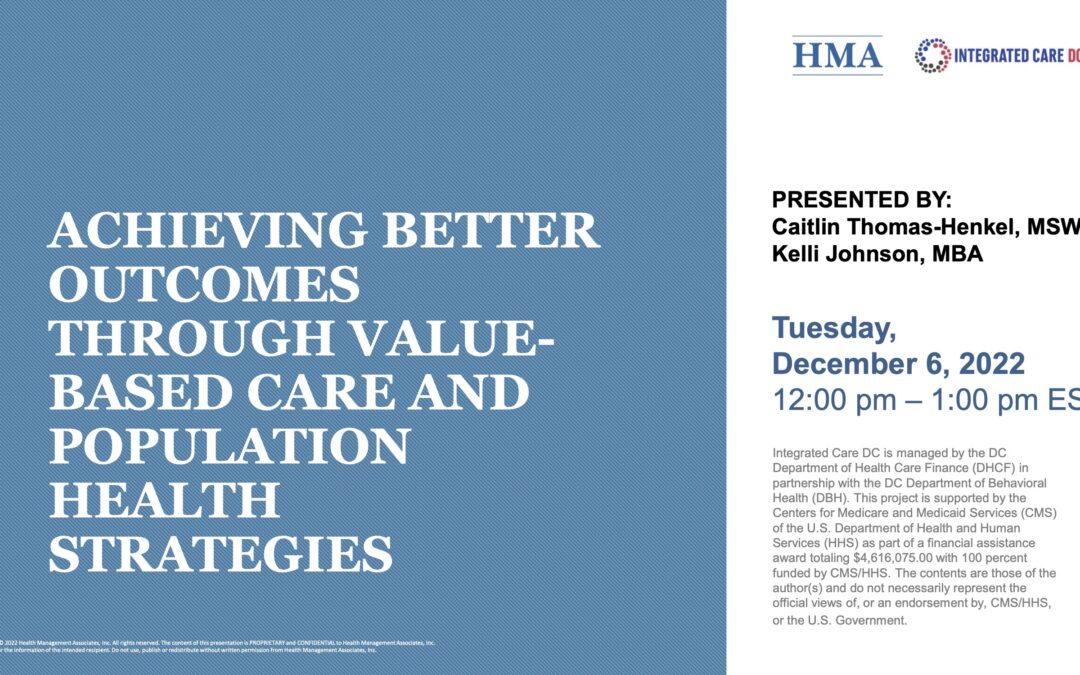
Achieving Better Outcomes Through Value-Based Care & Population Health Strategies (LAN Framework Part 2)
During this webinar, presenters discussed how proactive approaches to value-based care, including the use of VBP models, can improve individual and population health outcomes while enhancing efficiencies and reducing total costs. We also featured AmeriHealth’s new care coordination dashboard focused on helping providers close care gaps and achieve better patient outcomes.Behavioral Health Consultation: Handling Behavioral Health Emergencies in Primary Care (PCBH Part 5)
Managing emergencies is challenging in a high-volume, fast-paced environment. This webinar addresses the ways that BHCs and the primary care team can effectively and efficiently address emergencies.Viewing Time 60 Minutes
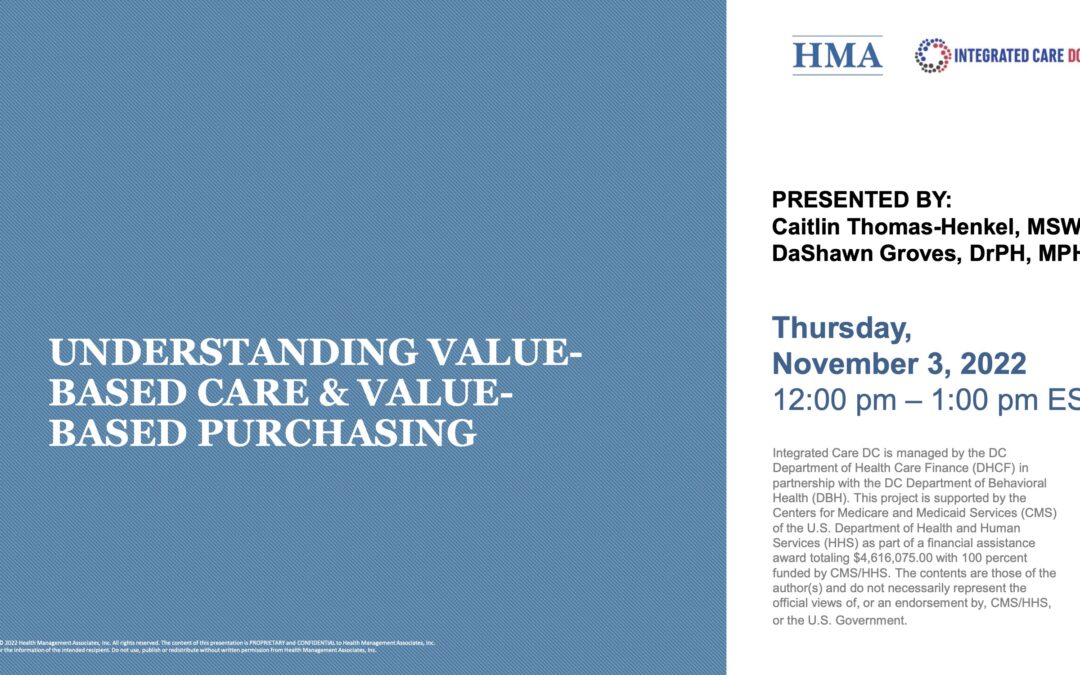
Understanding Value-Based Care & Value-Based Purchasing (LAN Framework Part 1)
During this webinar, participants will be able to identify the foundations of value-based care and the Health Care Payment Learning & Action Network (HCPLAN or LAN) value-based payment (VBP) framework. The presentation will also include the Department of Health Care Finance’s VBP strategy.It’s a Matter of Context & Compassion: Utilizing Contextualism to Promote Engagement and Health Behavioral Change (PCBH Part 4)
The session will address the realities of health behavioral change and subsequent adherence in integrated, primary care settings, and key lifestyle interventions and recommendations that transcend many evidence-based guidelines for chronic conditions (e.g., diabetes, hypertension, etc.). The session will discuss the importance of filtering evidence-based medicine guidelines through the prism of contextual and compassionate healthcare to increase the probability of patients embracing and implementing such interventions.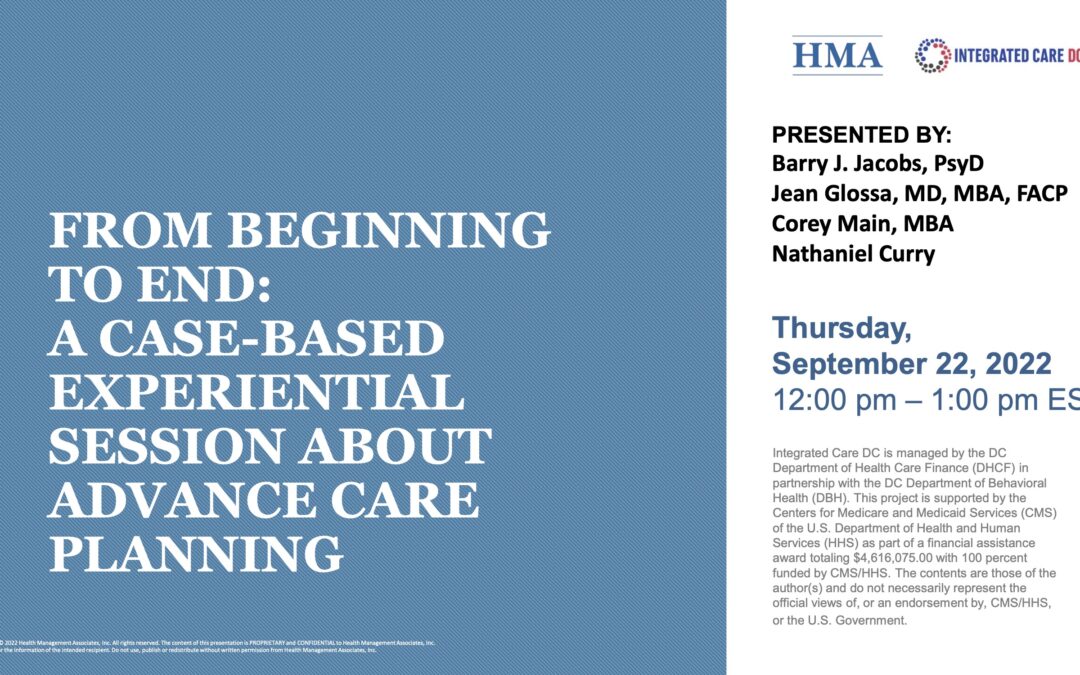
From Beginning to End: A Case-Based Experiential Session About Advance Care Planning (Advance Directive & Person-Centered Care Planning Series 3)
This case-based, hands-on session will allow physical and behavioral health professionals to walk through the steps of engaging patients with different presentations and personalities in Advance Care Planning, codifying their wishes in Advance Directives, and making those Advance Directives accessible on the health information exchange. The session’s experiential design will help providers consolidate their skills, increase their comfort and confidence, and feel inspired to approach patients about Advance Care Planning with new ideas and tools. It will include ad hoc case discussions and time for providers to raise questions and concerns.Making Brief Interventions Radical: Infusing focused Acceptance & Commitment Therapy Integrated Primary Care (PCBH Part 3)
This webinar discusses the concept of functional contextualism and the impact this philosophy has on the therapeutic orientation of focused Acceptance and Commitment Therapy (fACT). Specifically, the session will present fACT concepts such as the Contextual Interview, philosophical underpinnings, and influences of psychological flexibility. The session will also cover the philosophy of functional contextualism/fACT fits well within the Primary Care Behavioral Health philosophy.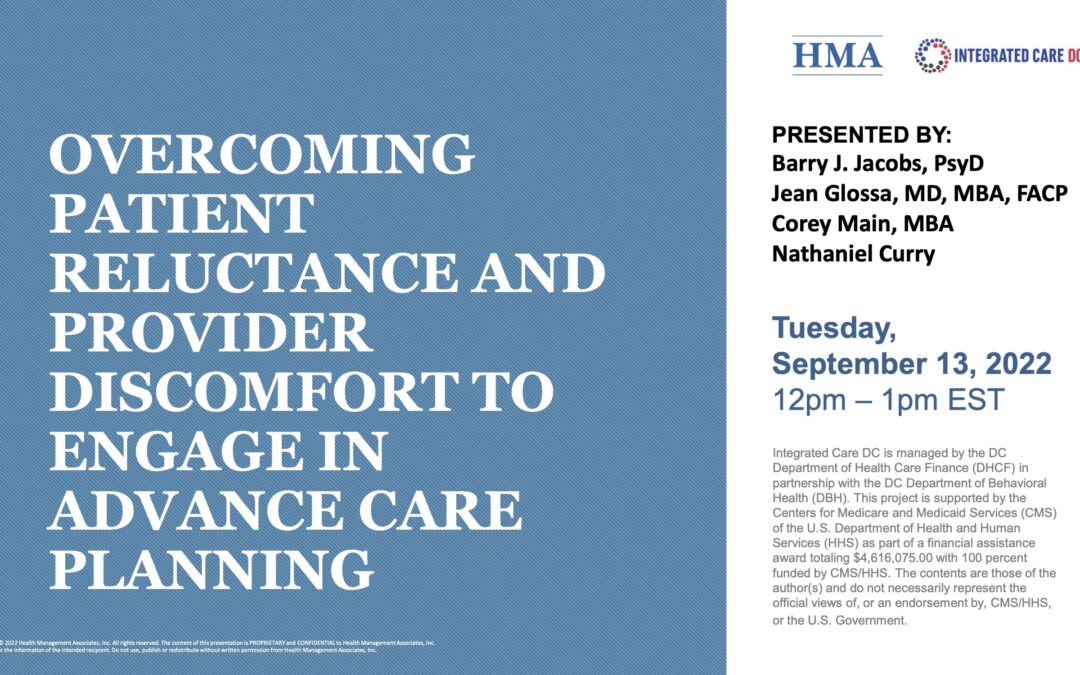
Overcoming Patient Reluctance & Provider Discomfort to Engage in Advance Care Planning (Advance Directive and Person-Centered Care Planning Series 2)
Among the many barriers to Advance Care Planning, patient reluctance and provider discomfort play large roles. In this highly interactive workshop, we’ll discuss concrete behavioral strategies for overcoming the fears that prevent patients from planning for end-of-life care or times when they are incapacitated. Specific topics include employing the spirit of Motivational Interviewing, normalizing doubts, and helping patients understand the benefits for their family members when they decline to plan. The importance of codifying patient wishes and uploading them to health information exchanges through AD Vault will be stressed. Case illustrations will be used throughout.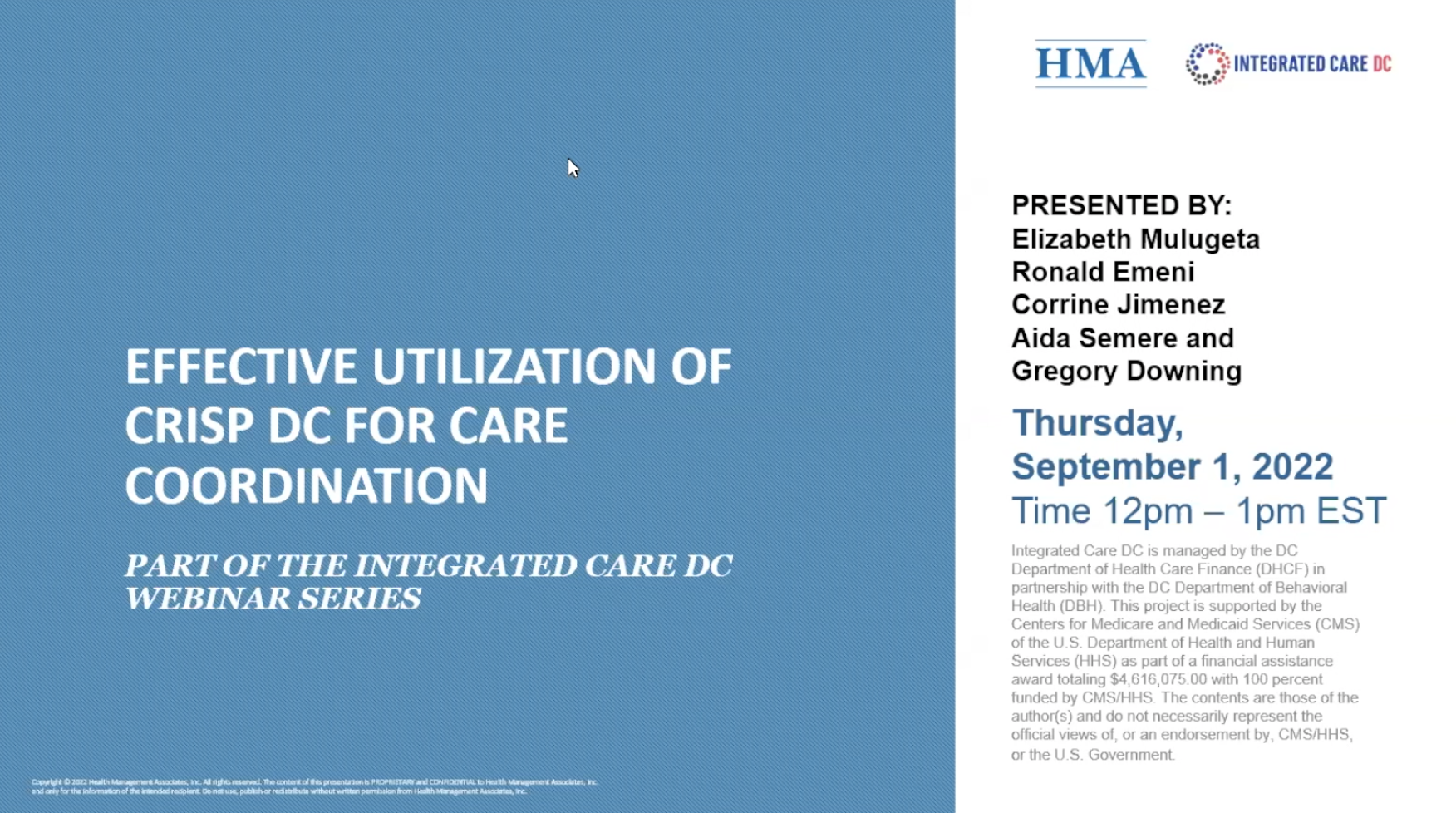
Effective Utilization of CRISP DC For Care Coordination By Outpatient Behavioral Health Providers (DCHA Transitions of Care 2)
Representatives from CRISP DC demonstrated how to use the platform to improve care coordination for patients across the healthcare system.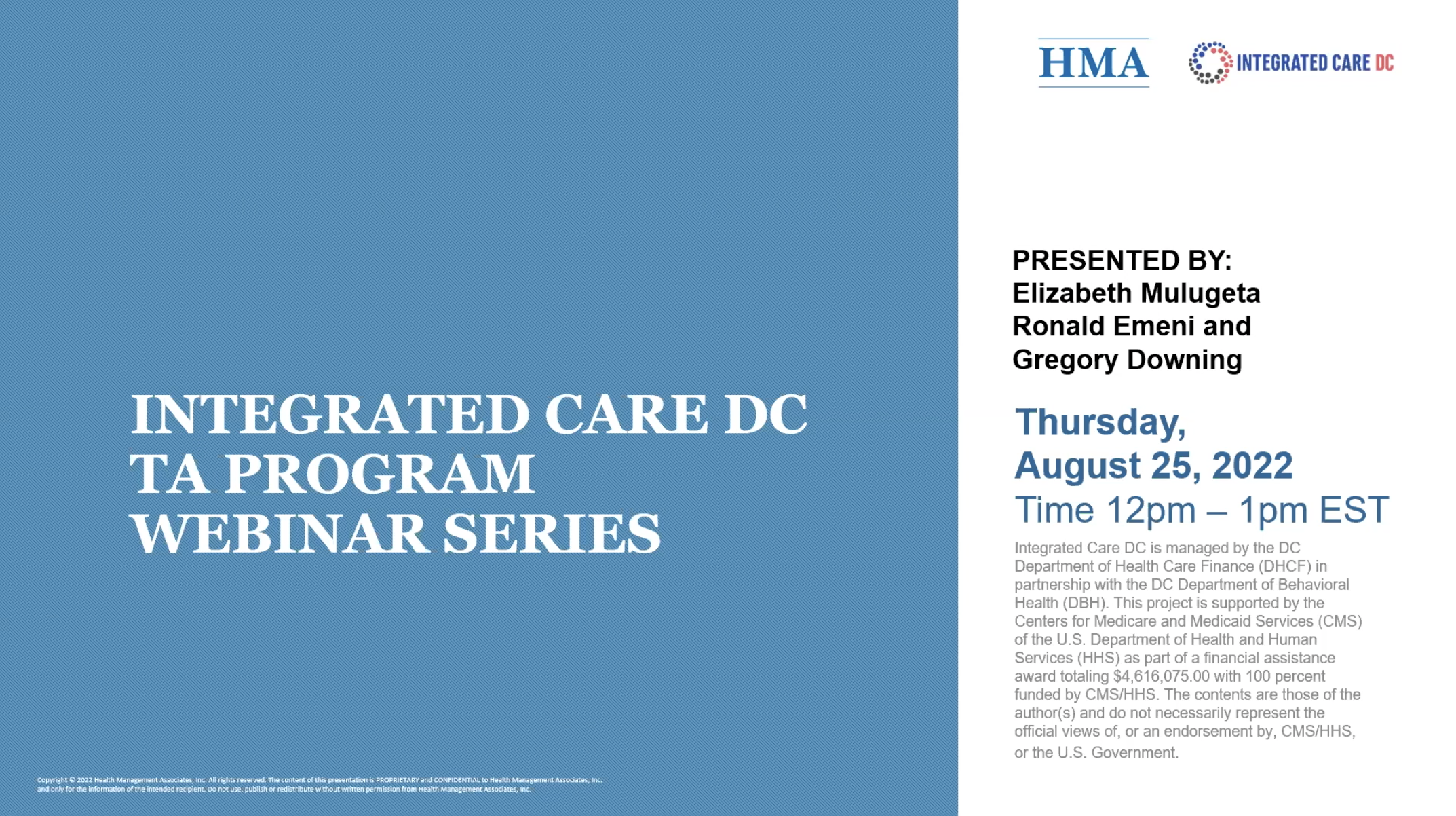
Effective Utilization of CRISP DC for Care Coordination by Hospitals (DCHA Transitions of Care 1)
Representatives from CRISP DC demonstrated how to use the platform to improve care coordination for patients across the healthcare system.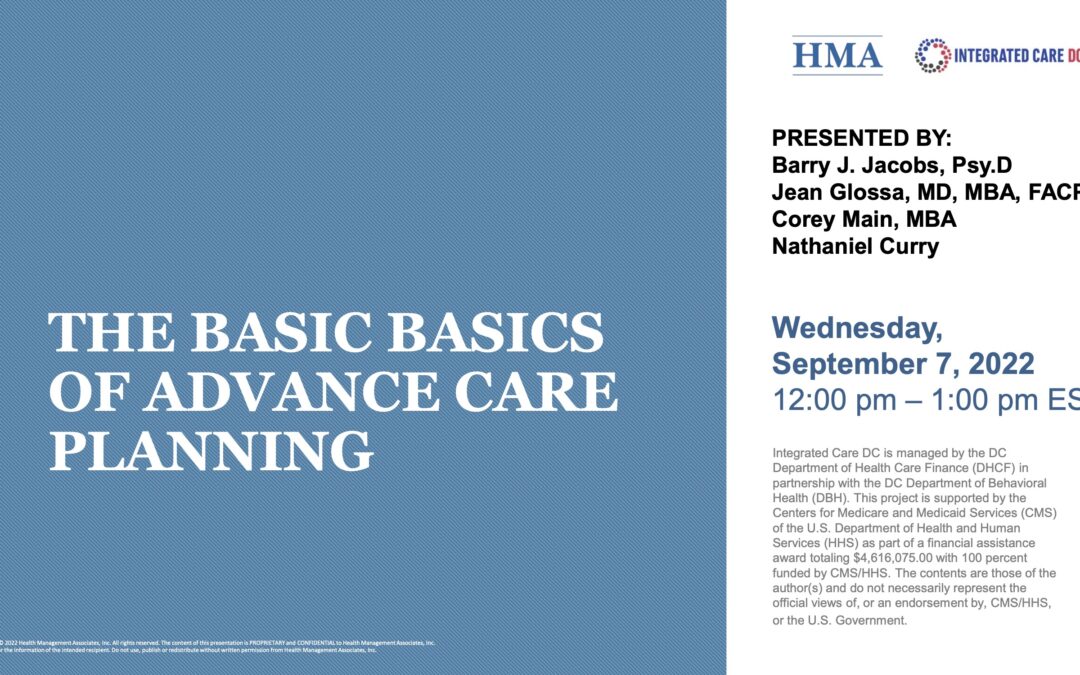
The Basic Basics of Advance Care Planning—What It Is, Why It’s Helpful, & How to Ensure It Matters (Advance Directive and Person-Centered Care Planning Series 1)
This interactive webinar will cover several key topics: clarifying the purpose and processes of Advance Care Planning; its importance for patient self-determination and reducing healthcare costs; providers’ roles as trusted guides in engaging patients in planning; and technological solutions for ensuring Advance Directives are widely downloadable when most needed. CRISP DC’s AD Vault will be introduced. Case illustrations will be used throughout.Consent to Share Substance Use Disorder Information: Office Hours (Consent Management Series 3)
This session will provide an open opportunity for DC Primary Care and Behavioral Health providers, practice administrators, care managers to drop in with questions or technical assistance requests. In this session, we will follow up on any questions or issues raised and unanswered in the first two sessions.Behavioral Health Consultation: Planning with the Patient (PCBH Part 2)
Every behavioral health care visit concludes with a plan that engages patients in active self-management. This webinar covers the steps to creating a collaborative plan with the patient that they can confidently implement between visits.Consent to Share Substance Use Disorder Information: A Provider’s Experience (Consent Management Series 2)
DC-based Medical Home Development Group, which successfully piloted CRISP DC HIE’s consent management tool, will discuss how it used the tool in its workflow and lessons learned. CRISP DC will also join the session to highlight key features and benefits of the consent management tool.Consent to Share Substance Use Disorder Information: The Basics (Consent Management Series 1)
This session will focus on enhancing care coordination for patients with SUD and the importance of gaining permission to release information. We will review scenarios such as: A 35-year-old patient is seeing her PCP. The patient has Type I diabetes and has been much better controlled since she has been in treatment for OUD for the past 5 years. Recently, the patient experienced some life stressors, lapsed and has not been back to treatment for two weeks. A 60-year-old patient has just recently started treatment for co-occurring depression and AUD after discussing treatment for many years with the PCP. He has hypertension and diabetes, and the alcohol use has been exacerbating these conditions for years. The PCP is concerned about the patient’s ability to stay in treatment as the patient has recently lost his job and is separating from his partner of many years. Staying informed of a patient’s recovery status can impact how you treat other health conditions and is an important component of their overall care. Have you hit barriers when trying to get the clinical information you need care for your patient? Are you aware of the new pathway to obtain this information? In this session, we will focus on consent management, how to talk with your patients about consent, the basics of 42 CFR Part 2, myth busting, use cases, and FAQs. We will introduce CRISP DC’s Consent Management tool, including a history of its development, gaps it will address, and key features and why this is a priority in the District.Behavioral Health Consultation: The Structure of the Visit (PCBH Part 1)
This highly interactive webinar will address the structure of the BHC visit from PCP screening for behavioral health conditions and implementing a warm handoff to the steps BHCs take when conducting a rapid and targeted functional assessment.What does it take to create a path towards incentive payment? (Understanding Primary Health Requirements for Incentive Payments Part 2)
A provider will demonstrate how it has decided to use the tools provided by AmeriHealth to start looking at integrated care outcomes. There will be time for audience questions and answers after a brief presentation.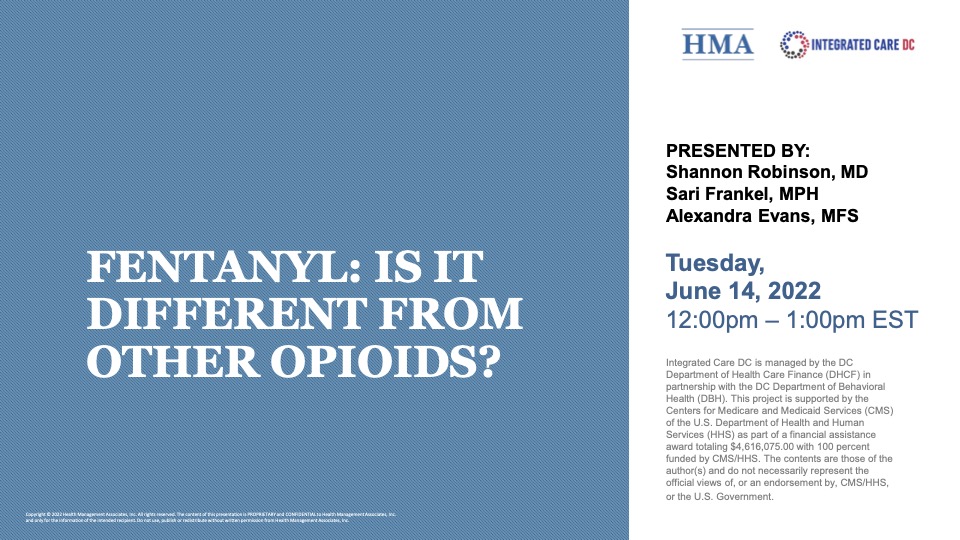
Fentanyl: Is it Different From Other Opioids? (Harm Reduction Session Part 3)
Fentanyl continues to have an increased presence in the drug supply necessitating reconsideration of prevailing treatment approaches for OUD. This session will explore inadvertent exposure and aspects of OUD treatment that may require updating given the high level of fentanyl now experienced in DC.Understanding How and Why Providers and Payers are Using Incentive Payments as a Tool to Improve Integration (Understanding Primary Health Requirements for Incentive Payments Part 1)
We will talk with Dr. Yavar Moghimi, Chief Psychiatric Medical Officer of AmeriHealth Caritas about why integrated care is important and the ways AmeriHealth is working with providers to identify and ultimately achieve key physical and behavioral health outcomes. There will be time for audience questions and answers after a brief interview-style presentation.Help! We’re so Short Staffed: Best Practices for Hiring and Retaining Your Workforce
Vice President of Human Resources at Mount Sinai Health System in NYC and Dr. Mary Awuonda Associate Professor of Howard University and Dean Mashonda Smith of UDC will be share lessons learned in the district and other large health systems. The aim of the conversation is to talk and learn from one another to develop solutions grounded in the realities of the Washington DC policy, regulatory and health care environment.Providers Responsibility in Managing Medical Conditions: Making Clinical Improvements & Meeting Quality Metrics
What’s the link between pay for performance and healthy eating on a budget? What about the link between quality metrics and understanding nutrition labels? These are all related topics that providers and practices address every day! Care teams work 1:1 with patients to better manage their chronic diseases while at the same time, measuring and reporting outcomes that are related to payments and incentives. During this webinar, we will make the connection between patient engagement strategies and meeting quality metrics. This webinar is designed for ALL AUDIENCES as everyone has a role in providing high-quality care- from the exam room to the boardroom. Prior to the webinar, we invite you to view this short video “Bites on a Budget” created by HMA Senior Associate, Brandin Bowden, MSc., as he attempts to build a healthy dinner for under $5. In this #HealthyDinnerChallenge, Brandin puts on his nutrition educator hat to share healthful tips to help your patients and clients navigate the grocery store, increase nutrient intake and promote comfort in the kitchen.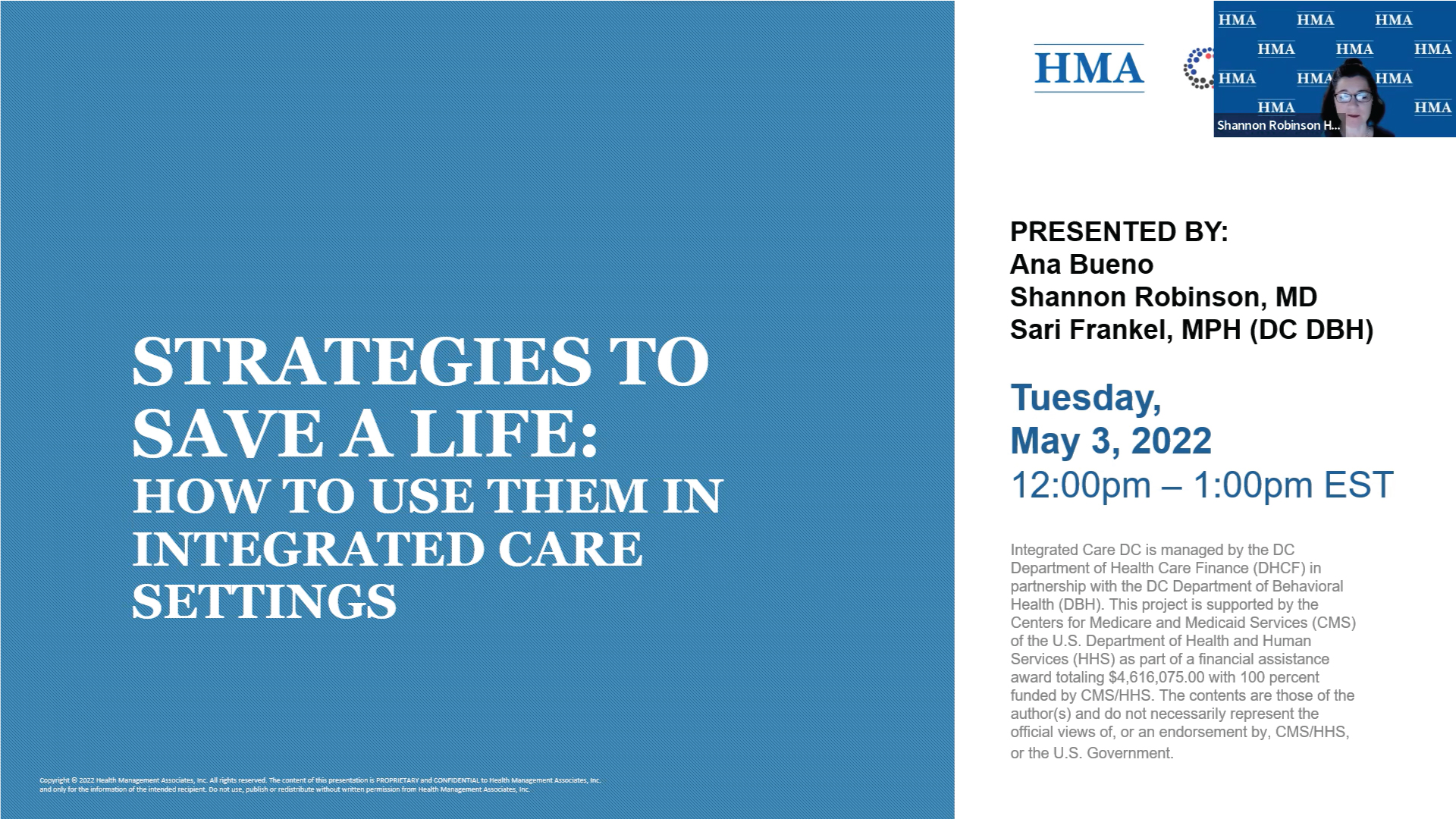
Harm Reduction Series Session 2: Strategies to Save A Life & How To Use Them In Integrated Care Settings
Health Management Associates invites you to join us for a lunch and learn workshop to learn more about Overdose Prevention and how to save a life in DC. In this interactive lunch and learn we will discuss DC’s Naloxone Distribution Program and the organizations currently providing Naloxone and provide: an overview of DC’s Standing Order and Samaritan Law an overview of the uses of opioids information on how naloxone stops an overdose and provide information on the action steps to take to save a life and stop an overdose. Where and how individuals can access naloxone, syringe services, and fentanyl test strips in DC.The Primary Care Behavioral Health (PCBH) Model of Integrated Care
The Primary Care Behavioral Health Consultation model (PCBH) is a psychological approach to population-based clinical health care that is simultaneously co-located, collaborative, and integrated within the primary care clinic. The goal of PCBH is to improve and promote overall health within the general population. This approach is important because approximately half of all patients in primary care present with psychiatric comorbidities, and 60% of psychiatric illness is treated in primary care. This webinar overs the framework of the PCBH model, the behavioral health consultant role, and a day-in-the-life look at integrated care using this model.